Deck 3: Polynomial and Rational Functions
Question
Question
Question
Question
Question
Question
Question
Question
Question
Question
Question
Question
Question
Question
Question
Question
Question
Question
Question
Question
Question
Question
Question
Question
Question
Question
Question
Question
Question
Question
Question
Question
Question
Question
Question
Question
Question
Question
Question
Question
Question
Question
Question
Question
Question
Question
Question
Question
Question
Question
Question
Question
Question
Question
Question
Question
Question
Question
Question
Question
Question
Question
Question
Question
Question
Question
Question
Question
Question
Question
Question
Question
Question
Question
Question
Question
Question
Question
Question
Question

Unlock Deck
Sign up to unlock the cards in this deck!
Unlock Deck
Unlock Deck
1/137
Play
Full screen (f)
Deck 3: Polynomial and Rational Functions
1
A function is given. Use a graphing calculator to draw the graph of
f. Find the domain and range of f from the graph.
f. Find the domain and range of f from the graph.

Domain: 
, Range

, Range

2
Sketch the graph of the function. 

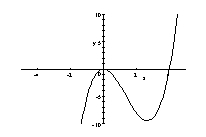
3


4
A function is given. (a) Find all the local maximum and minimum values of the function and the value of x at which each occurs
b) Find the intervals on which the function is increasing and on which the function is decreasing. State each answer correct to two decimal places.
b) Find the intervals on which the function is increasing and on which the function is decreasing. State each answer correct to two decimal places.


Unlock Deck
Unlock for access to all 137 flashcards in this deck.
Unlock Deck
k this deck
5
Use a graphing device to draw the graph of the function
State approximately the intervals on which the function is increasing and on which the function is decreasing.
State approximately the intervals on which the function is increasing and on which the function is decreasing.

Unlock Deck
Unlock for access to all 137 flashcards in this deck.
Unlock Deck
k this deck
6
Determine whether the function in the figure is even, odd, or neither. 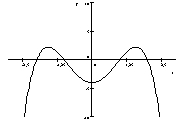


Unlock Deck
Unlock for access to all 137 flashcards in this deck.
Unlock Deck
k this deck
7
Describe how the graph of 
can be obtained from the graph of

can be obtained from the graph of


Unlock Deck
Unlock for access to all 137 flashcards in this deck.
Unlock Deck
k this deck
8
For the function
determine the average rate of change between the values
and
determine the average rate of change between the values
and

Unlock Deck
Unlock for access to all 137 flashcards in this deck.
Unlock Deck
k this deck
9

Unlock Deck
Unlock for access to all 137 flashcards in this deck.
Unlock Deck
k this deck
10
Find the range of the function.

Unlock Deck
Unlock for access to all 137 flashcards in this deck.
Unlock Deck
k this deck
11
The graph shows the depth of water W in a reservoir over a one-year period as a function of the number of days x since the beginning of the year. What was the average rate of change of W between x = 0 and x= 100?
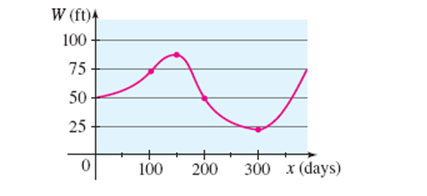


Unlock Deck
Unlock for access to all 137 flashcards in this deck.
Unlock Deck
k this deck
12
Determine whether or not the function
is one-to-one.
is one-to-one.

Unlock Deck
Unlock for access to all 137 flashcards in this deck.
Unlock Deck
k this deck
13
Given 
and
, find
,
.

and

, find

,

.

Unlock Deck
Unlock for access to all 137 flashcards in this deck.
Unlock Deck
k this deck
14
Use and to evaluate the expression

Unlock Deck
Unlock for access to all 137 flashcards in this deck.
Unlock Deck
k this deck
15
Find the domain of the function.

Unlock Deck
Unlock for access to all 137 flashcards in this deck.
Unlock Deck
k this deck
16
Sketch the graph of the function. 


Unlock Deck
Unlock for access to all 137 flashcards in this deck.
Unlock Deck
k this deck
17

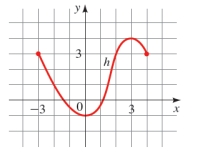

Unlock Deck
Unlock for access to all 137 flashcards in this deck.
Unlock Deck
k this deck
18
If an object is dropped from a high cliff or a tall building, then the distance it has fallen after t seconds is given by the function 
Find its average speed (average rate of change) over the following intervals:
(i) Between 1 s and 6 s
(ii) Between

Find its average speed (average rate of change) over the following intervals:
(i) Between 1 s and 6 s
(ii) Between


Unlock Deck
Unlock for access to all 137 flashcards in this deck.
Unlock Deck
k this deck
19
Draw the graph of the function in an appropriate viewing rectangle. 


Unlock Deck
Unlock for access to all 137 flashcards in this deck.
Unlock Deck
k this deck
20



Unlock Deck
Unlock for access to all 137 flashcards in this deck.
Unlock Deck
k this deck
21
Use a graphing calculator to estimate the range of the function. 


Unlock Deck
Unlock for access to all 137 flashcards in this deck.
Unlock Deck
k this deck
22
Find the domain of the function.

Unlock Deck
Unlock for access to all 137 flashcards in this deck.
Unlock Deck
k this deck
23
Sketch the graph of the function. 


Unlock Deck
Unlock for access to all 137 flashcards in this deck.
Unlock Deck
k this deck
24
Sketch the graph of the piecewise defined function. 


Unlock Deck
Unlock for access to all 137 flashcards in this deck.
Unlock Deck
k this deck
25
Use a graphing calculator to determine approximately the intervals on which the function is increasing, and on which is decreasing.

Unlock Deck
Unlock for access to all 137 flashcards in this deck.
Unlock Deck
k this deck
26
Determine whether each curve represents a graph of a function.
a.)

b.)

c.)

d.)
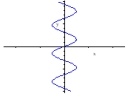
a.)

b.)

c.)

d.)


Unlock Deck
Unlock for access to all 137 flashcards in this deck.
Unlock Deck
k this deck
27
If an object is dropped from a high cliff or a tall building, then the distance it has fallen after t seconds is given by the function
Find its average speed (average rate of change) over the following intervals:
(i) Between 2 s and 7 s
(ii) Between
Find its average speed (average rate of change) over the following intervals:
(i) Between 2 s and 7 s
(ii) Between

Unlock Deck
Unlock for access to all 137 flashcards in this deck.
Unlock Deck
k this deck
28
For the function
determine the average rate of change between the values and .
determine the average rate of change between the values and .

Unlock Deck
Unlock for access to all 137 flashcards in this deck.
Unlock Deck
k this deck
29
Determine if the equation
defines as a function of . Explain your answer.
defines as a function of . Explain your answer.

Unlock Deck
Unlock for access to all 137 flashcards in this deck.
Unlock Deck
k this deck
30
A function is given. Use a graphing calculator to draw the graph of f. Find the domain and range of f from the graph.

Unlock Deck
Unlock for access to all 137 flashcards in this deck.
Unlock Deck
k this deck
31
A function is given. (a) Find all the local maximum and minimum values of the function and the value of x at which each occurs
b) Find the intervals on which the function is increasing and on which the function is decreasing. State each answer correct to two decimal places.
b) Find the intervals on which the function is increasing and on which the function is decreasing. State each answer correct to two decimal places.


Unlock Deck
Unlock for access to all 137 flashcards in this deck.
Unlock Deck
k this deck
32
Describe how the graph of
can be obtained from the graph of
can be obtained from the graph of

Unlock Deck
Unlock for access to all 137 flashcards in this deck.
Unlock Deck
k this deck
33
A function f is given, and the indicated transformations are applied to its graph (in the given order). Write the equation for the final transformed graph. ; shift to the left unit, shrink vertically by a factor of 0.2, and shift downward 2 units.

Unlock Deck
Unlock for access to all 137 flashcards in this deck.
Unlock Deck
k this deck
34
Find the inverse of the function. ,

Unlock Deck
Unlock for access to all 137 flashcards in this deck.
Unlock Deck
k this deck
35
Sketch the graph of the function 
.

.

Unlock Deck
Unlock for access to all 137 flashcards in this deck.
Unlock Deck
k this deck
36
Determine whether
is even, odd, or neither.
is even, odd, or neither.

Unlock Deck
Unlock for access to all 137 flashcards in this deck.
Unlock Deck
k this deck
37
Use a graphing calculator or computer to determine whether or not the function is one-to-one.

Unlock Deck
Unlock for access to all 137 flashcards in this deck.
Unlock Deck
k this deck
38
Graphs of the functions f and g are given
a) Which is larger,
b) Which is larger,
c)For which values of x is
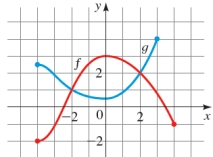
a) Which is larger,

b) Which is larger,

c)For which values of x is



Unlock Deck
Unlock for access to all 137 flashcards in this deck.
Unlock Deck
k this deck
39
Find the inverse of the function.

Unlock Deck
Unlock for access to all 137 flashcards in this deck.
Unlock Deck
k this deck
40
For the function given, find , , and

Unlock Deck
Unlock for access to all 137 flashcards in this deck.
Unlock Deck
k this deck
41
Determine which viewing rectangle produces the most appropriate graph of the function. 


Unlock Deck
Unlock for access to all 137 flashcards in this deck.
Unlock Deck
k this deck
42
Use a graphing device to draw the graph of the function
. State approximately the intervals on which the function is increasing and on which the function is decreasing.
. State approximately the intervals on which the function is increasing and on which the function is decreasing.

Unlock Deck
Unlock for access to all 137 flashcards in this deck.
Unlock Deck
k this deck
43
Find the inverse of the function.

Unlock Deck
Unlock for access to all 137 flashcards in this deck.
Unlock Deck
k this deck
44
Determine whether the curve represents a graph of a function. 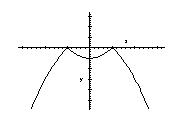
A) Function; the graph passes the horizontal line test
B) Function; the graph passes the vertical line test
C) Not a function; the graph passes the vertical line test
D) Not a function; the graph passes the horizontal line test
E) none

A) Function; the graph passes the horizontal line test
B) Function; the graph passes the vertical line test
C) Not a function; the graph passes the vertical line test
D) Not a function; the graph passes the horizontal line test
E) none

Unlock Deck
Unlock for access to all 137 flashcards in this deck.
Unlock Deck
k this deck
45
The graph shows the depth of water W in a reservoir over a one-year period as a function of the number of days x since the beginning of the year. Estimate the average rate of change of W between x = 0 and x= 100? 


Unlock Deck
Unlock for access to all 137 flashcards in this deck.
Unlock Deck
k this deck
46
Determine whether or not the function 
is one-to-one.

is one-to-one.

Unlock Deck
Unlock for access to all 137 flashcards in this deck.
Unlock Deck
k this deck
47
Use a graphing calculator to determine approximately the internals on which the function is decreasing.
A)
B)
C)
D)
E)
A)
B)
C)
D)
E)

Unlock Deck
Unlock for access to all 137 flashcards in this deck.
Unlock Deck
k this deck
48
Use a graphing calculator to find, approximately the range of the function. 


Unlock Deck
Unlock for access to all 137 flashcards in this deck.
Unlock Deck
k this deck
49
If an object is dropped from a high cliff or a tall building, then the distance it has fallen after t seconds is given by the function  Find its average speed (average rate of change) over the interval between
Find its average speed (average rate of change) over the interval between 
A)
B)
C)
D)
E) none of these
 Find its average speed (average rate of change) over the interval between
Find its average speed (average rate of change) over the interval between 
A)

B)

C)

D)

E) none of these

Unlock Deck
Unlock for access to all 137 flashcards in this deck.
Unlock Deck
k this deck
50
Find the inverse of the function.

Unlock Deck
Unlock for access to all 137 flashcards in this deck.
Unlock Deck
k this deck
51
Given and
, find ,
, find ,

Unlock Deck
Unlock for access to all 137 flashcards in this deck.
Unlock Deck
k this deck
52
Evaluate , ,
, for the piecewise-defined function.
A)
B)
C)
D)
E) none of these
, for the piecewise-defined function.
A)
B)
C)
D)
E) none of these

Unlock Deck
Unlock for access to all 137 flashcards in this deck.
Unlock Deck
k this deck
53
Sketch the graph of the function e) 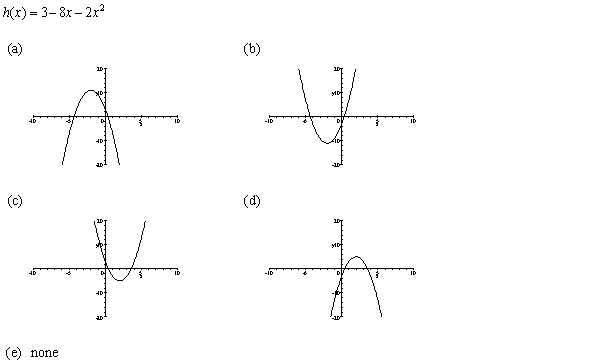


Unlock Deck
Unlock for access to all 137 flashcards in this deck.
Unlock Deck
k this deck
54
Determine whether the function in the figure is even, odd, or neither. 


Unlock Deck
Unlock for access to all 137 flashcards in this deck.
Unlock Deck
k this deck
55
For the function determine the average rate of change between the values
And
A)
B)
C)
D)
E)
And
A)
B)
C)
D)
E)

Unlock Deck
Unlock for access to all 137 flashcards in this deck.
Unlock Deck
k this deck
56
Use a graphing calculator or computer to determine whether or not the function is one-to-one.

Unlock Deck
Unlock for access to all 137 flashcards in this deck.
Unlock Deck
k this deck
57
A function f is given, and the indicated transformations are applied to its graph (in the given order). Find the equation for the final transformed graph. 


Unlock Deck
Unlock for access to all 137 flashcards in this deck.
Unlock Deck
k this deck
58
Sketch the graph of the function. 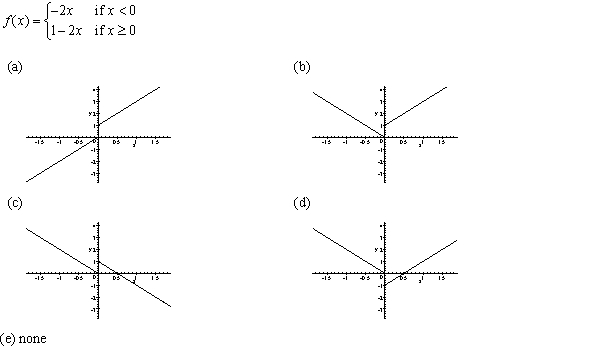


Unlock Deck
Unlock for access to all 137 flashcards in this deck.
Unlock Deck
k this deck
59
If and
, find and
, find and

Unlock Deck
Unlock for access to all 137 flashcards in this deck.
Unlock Deck
k this deck
60
Determine if the equation defines y as a function of x
A) The equation represents a function because it's a circle
B) The equation represents a function because for each value of x there is always two values of y
C) Not a function because the equation gives two values of y for a given value of x
D) The equation represents a function because it passes the vertical line test
E) Not a function because the equation passes the vertical line test.
A) The equation represents a function because it's a circle
B) The equation represents a function because for each value of x there is always two values of y
C) Not a function because the equation gives two values of y for a given value of x
D) The equation represents a function because it passes the vertical line test
E) Not a function because the equation passes the vertical line test.

Unlock Deck
Unlock for access to all 137 flashcards in this deck.
Unlock Deck
k this deck
61
Find the domain of the function. 


Unlock Deck
Unlock for access to all 137 flashcards in this deck.
Unlock Deck
k this deck
62
For the function determine the average rate of change between the values And
A)
B)
C)
D)
E)
A)
B)
C)
D)
E)

Unlock Deck
Unlock for access to all 137 flashcards in this deck.
Unlock Deck
k this deck
63
Evaluate , ,
, for the piecewise-defined function.
A)
B)
C)
D)
E) none of these
, for the piecewise-defined function.
A)
B)
C)
D)
E) none of these

Unlock Deck
Unlock for access to all 137 flashcards in this deck.
Unlock Deck
k this deck
64
Find the range of the function. 


Unlock Deck
Unlock for access to all 137 flashcards in this deck.
Unlock Deck
k this deck
65
Find the inverse of the function. 
A)
B)
C)
D)
E) none of these

A)

B)

C)

D)

E) none of these

Unlock Deck
Unlock for access to all 137 flashcards in this deck.
Unlock Deck
k this deck
66
Use a graphing calculator to find, approximately the range of the function. 
A)
B)
C)
D)
E)

A)

B)

C)

D)

E)


Unlock Deck
Unlock for access to all 137 flashcards in this deck.
Unlock Deck
k this deck
67
Determine whether the curve represents a graph of a function. 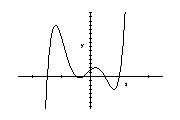
A) Function; the graph passes the horizontal line test
B) Function; the graph passes the vertical line test
C) Not a function; the graph passes the vertical line test
D) Not a function; the graph passes the horizontal line test
E) none

A) Function; the graph passes the horizontal line test
B) Function; the graph passes the vertical line test
C) Not a function; the graph passes the vertical line test
D) Not a function; the graph passes the horizontal line test
E) none

Unlock Deck
Unlock for access to all 137 flashcards in this deck.
Unlock Deck
k this deck
68
Determine which functions are one-to-one. 
A) I only
B) I, II
C) I, II, III
D) II only
E) III only

A) I only
B) I, II
C) I, II, III
D) II only
E) III only

Unlock Deck
Unlock for access to all 137 flashcards in this deck.
Unlock Deck
k this deck
69
Find the inverse of the function. 


Unlock Deck
Unlock for access to all 137 flashcards in this deck.
Unlock Deck
k this deck
70
Determine which viewing rectangle produces the most appropriate graph of the function. 
A)
B)
C)
D)
E)

A)

B)

C)

D)

E)


Unlock Deck
Unlock for access to all 137 flashcards in this deck.
Unlock Deck
k this deck
71


Unlock Deck
Unlock for access to all 137 flashcards in this deck.
Unlock Deck
k this deck
72
Given and , find
A)
B)
C)
D)
E)
A)
B)
C)
D)
E)

Unlock Deck
Unlock for access to all 137 flashcards in this deck.
Unlock Deck
k this deck
73
If and , find and
A)
B)
C) ;
D) ;
E) none of these
A)
B)
C) ;
D) ;
E) none of these

Unlock Deck
Unlock for access to all 137 flashcards in this deck.
Unlock Deck
k this deck
74
Find the average rate of change of the function  between the points given.
between the points given. 
A)
B)
C)
D)
E)
 between the points given.
between the points given. 
A)

B)

C)

D)

E)


Unlock Deck
Unlock for access to all 137 flashcards in this deck.
Unlock Deck
k this deck
75
Sketch the graph of the function.
A)
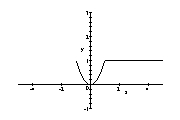
B)
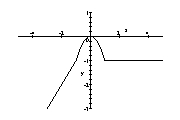
C)
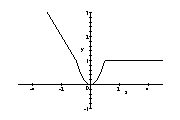
D)
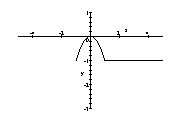
E) none
A)

B)

C)

D)

E) none

Unlock Deck
Unlock for access to all 137 flashcards in this deck.
Unlock Deck
k this deck
76
Determine if the equation  defines y as a function of x
defines y as a function of x
A) The equation represents a function because it's a circle
B) The equation represents a function because for each value of x there is always two values of y
C) Not a function because the equation gives two values of y for a given value of x
D) The equation represents a function because it passes the vertical line test
E) Not a function because the equation passes the vertical line test.
 defines y as a function of x
defines y as a function of xA) The equation represents a function because it's a circle
B) The equation represents a function because for each value of x there is always two values of y
C) Not a function because the equation gives two values of y for a given value of x
D) The equation represents a function because it passes the vertical line test
E) Not a function because the equation passes the vertical line test.

Unlock Deck
Unlock for access to all 137 flashcards in this deck.
Unlock Deck
k this deck
77


Unlock Deck
Unlock for access to all 137 flashcards in this deck.
Unlock Deck
k this deck
78


Unlock Deck
Unlock for access to all 137 flashcards in this deck.
Unlock Deck
k this deck
79
A function f is given, and the indicated transformations are applied to its graph (in the given order). Find the equation for the final transformed graph.  ; shift 5 units to the left, stretch vertically by a factor of 2, and reflect in the x-axis
; shift 5 units to the left, stretch vertically by a factor of 2, and reflect in the x-axis
A)
B)
C)
D)
E)
 ; shift 5 units to the left, stretch vertically by a factor of 2, and reflect in the x-axis
; shift 5 units to the left, stretch vertically by a factor of 2, and reflect in the x-axisA)

B)

C)

D)

E)


Unlock Deck
Unlock for access to all 137 flashcards in this deck.
Unlock Deck
k this deck
80
Sketch the graph of the function. 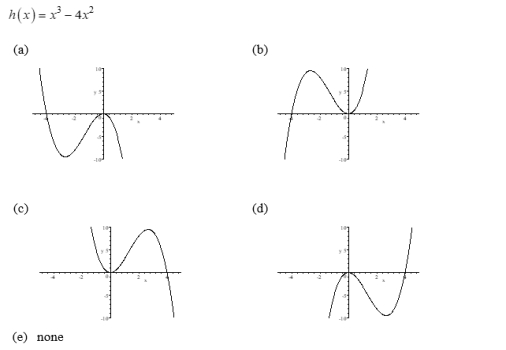


Unlock Deck
Unlock for access to all 137 flashcards in this deck.
Unlock Deck
k this deck


